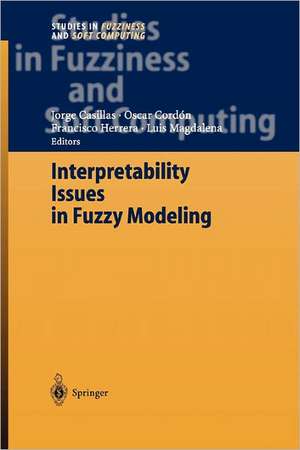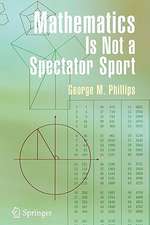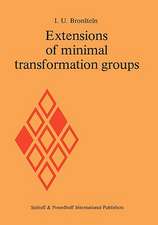Interpretability Issues in Fuzzy Modeling: Studies in Fuzziness and Soft Computing, cartea 128
Editat de Jorge Casillas, O. Cordón, Francisco Herrera Triguero, Luis Magdalenaen Limba Engleză Paperback – 16 dec 2010
| Toate formatele și edițiile | Preț | Express |
|---|---|---|
| Paperback (1) | 1234.00 lei 6-8 săpt. | |
| Springer Berlin, Heidelberg – 16 dec 2010 | 1234.00 lei 6-8 săpt. | |
| Hardback (1) | 1240.47 lei 6-8 săpt. | |
| Springer Berlin, Heidelberg – 4 iun 2003 | 1240.47 lei 6-8 săpt. |
Din seria Studies in Fuzziness and Soft Computing
- 20%
 Preț: 999.85 lei
Preț: 999.85 lei - 20%
 Preț: 653.06 lei
Preț: 653.06 lei - 20%
 Preț: 872.98 lei
Preț: 872.98 lei - 20%
 Preț: 930.57 lei
Preț: 930.57 lei - 20%
 Preț: 1051.00 lei
Preț: 1051.00 lei - 20%
 Preț: 992.44 lei
Preț: 992.44 lei - 20%
 Preț: 655.85 lei
Preț: 655.85 lei - 20%
 Preț: 1001.86 lei
Preț: 1001.86 lei - 18%
 Preț: 954.14 lei
Preț: 954.14 lei - 20%
 Preț: 330.10 lei
Preț: 330.10 lei - 20%
 Preț: 333.04 lei
Preț: 333.04 lei - 20%
 Preț: 997.56 lei
Preț: 997.56 lei -
 Preț: 391.61 lei
Preț: 391.61 lei - 20%
 Preț: 647.79 lei
Preț: 647.79 lei - 20%
 Preț: 986.01 lei
Preț: 986.01 lei - 18%
 Preț: 958.56 lei
Preț: 958.56 lei - 20%
 Preț: 996.40 lei
Preț: 996.40 lei - 20%
 Preț: 999.35 lei
Preț: 999.35 lei - 15%
 Preț: 646.43 lei
Preț: 646.43 lei - 20%
 Preț: 651.57 lei
Preț: 651.57 lei - 20%
 Preț: 997.89 lei
Preț: 997.89 lei - 15%
 Preț: 641.03 lei
Preț: 641.03 lei - 20%
 Preț: 1009.74 lei
Preț: 1009.74 lei - 20%
 Preț: 992.62 lei
Preț: 992.62 lei -
 Preț: 388.72 lei
Preț: 388.72 lei - 18%
 Preț: 1223.43 lei
Preț: 1223.43 lei - 20%
 Preț: 651.42 lei
Preț: 651.42 lei - 18%
 Preț: 951.59 lei
Preț: 951.59 lei - 18%
 Preț: 948.61 lei
Preț: 948.61 lei
Preț: 1234.00 lei
Preț vechi: 1504.88 lei
-18% Nou
Puncte Express: 1851
Preț estimativ în valută:
236.16€ • 245.64$ • 194.96£
236.16€ • 245.64$ • 194.96£
Carte tipărită la comandă
Livrare economică 14-28 aprilie
Preluare comenzi: 021 569.72.76
Specificații
ISBN-13: 9783642057021
ISBN-10: 3642057020
Pagini: 660
Ilustrații: XIV, 643 p.
Dimensiuni: 155 x 235 x 35 mm
Greutate: 0.91 kg
Ediția:Softcover reprint of hardcover 1st ed. 2003
Editura: Springer Berlin, Heidelberg
Colecția Springer
Seria Studies in Fuzziness and Soft Computing
Locul publicării:Berlin, Heidelberg, Germany
ISBN-10: 3642057020
Pagini: 660
Ilustrații: XIV, 643 p.
Dimensiuni: 155 x 235 x 35 mm
Greutate: 0.91 kg
Ediția:Softcover reprint of hardcover 1st ed. 2003
Editura: Springer Berlin, Heidelberg
Colecția Springer
Seria Studies in Fuzziness and Soft Computing
Locul publicării:Berlin, Heidelberg, Germany
Public țintă
ResearchCuprins
Interpretability improvements to find the balance interpretability-accuracy in fuzzy modeling: an overview.- Regaining comprehensibility of approximative fuzzy models via the use of linguistic hedges.- Identifying flexible structured premises for mining concise fuzzy knowledge.- A multiobjective genetic learning process for joint feature selection and granularity and contexts learning in fuzzy rule-based classification systems.- Extracting linguistic fuzzy models from numerical data-AFRELI algorithm.- Constrained optimization of fuzzy decision trees.- A new method for inducing a set of interpretable fuzzy partitions and fuzzy inference systems from data.- A Feature Ranking Algorithm for Fuzzy Modelling Problems.- Interpretability in multidimensional classification.- Interpretable semi-mechanistic fuzzy models by clustering, OLS and FIS model reduction.- Trade-off between approximation accuracy and complexity: TS controller design via HOSVD based complexity minimization.- Simplification and reduction of fuzzy rules.- Effect of rule representation in rule base reduction.- Singular value-based fuzzy reduction with relaxed normalization condition.- Interpretability, complexity, and modular structure of fuzzy systems.- Hierarchical genetic fuzzy systems: accuracy, interpretability and design autonomy.- About the trade-off between accuracy and interpretability of Takagi-Sugeno models in the context of nonlinear time series forecasting.- Accurate, transparent and compact fuzzy models by multi-objective evolutionary algorithms.- Transparent fuzzy systems in modeling and control.- Uniform fuzzy partitions with cardinal splines and wavelets: getting interpretable linguistic fuzzy models.- Relating the theory of partitions in MV-logic to the design of interpretable fuzzy systems.-A formal model of interpretability of linguistic variables.- Expressing relevance and interpretability of rule-based systems.- Conciseness of fuzzy models.- Exact trade-off between approximation accuracy and interpretability: solving the saturation problem for certain FRBSs.- Interpretability improvement of RBF-based neurofuzzy systems using regularized learning.- Extracting fuzzy classification rules from fuzzy clusters on the basis of separating hyperplanes.
Textul de pe ultima copertă
Fuzzy modeling has become one of the most productive and successful results of fuzzy logic. Among others, it has been applied to knowledge discovery, automatic classification, long-term prediction, or medical and engineering analysis. The research developed in the topic during the last two decades has been mainly focused on exploiting the fuzzy model flexibility to obtain the highest accuracy. This approach usually sets aside the interpretability of the obtained models. However, we should remember the initial philosophy of fuzzy sets theory directed to serve the bridge between the human understanding and the machine processing. In this challenge, the ability of fuzzy models to express the behavior of the real system in a comprehensible manner acquires a great importance. This book collects the works of a group of experts in the field that advocate the interpretability improvements as a mechanism to obtain well balanced fuzzy models.
Caracteristici
Focused on interpretability in fuzzy models Reader will acquire a deep knowledge on practical topics such as system identification with fuzzy systems and interpretability State of the art on the trade-off betwen interpretability and precision in fuzzy rule-based modeling Includes supplementary material: sn.pub/extras























